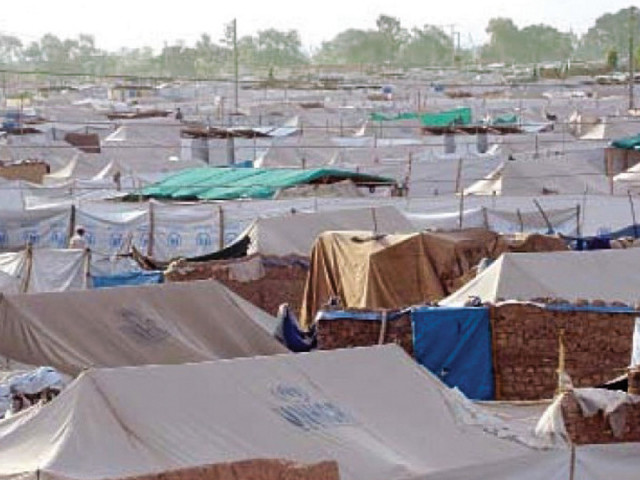IDP camp blast: From Khyber to Jalozai, death follows victims of war
Tamana was busy in her make-shift home at Jalozai Camp when an explosion occurred at its food-distribution point.

Tamana was busy in her make-shift home at Jalozai Camp when an explosion occurred at its food-distribution point. PHOTO: FILE
She was third down on a hospital list of received casualties but to her husband, Abdul Ghafar Khan, she was Tamana, a much loved 32-year-old woman, who left behind five daughters.
Tamana was busy in her make-shift home at Jalozai Camp when an explosion occurred at its food-distribution point on March 21, and she added to the list of 17 deceased victims.
Their eldest daughter Salma is seven, Zainab is five, Aasma is four and Muskan is two years old. There is no one old enough to look after the youngest, seven-month-old Sumaiya.
“We had no other option but to shift to the IDP (Internally Displaced Persons) camp in order to save our lives,” said Ghaffar, finding it difficult to hold back his tears. His elder brother, Shad Khan has been missing for a year.
“We did not know death would follow us here. We have already lost business, property, and our relatives at the hands of this war,” he mourned. He was not present when the incident took place, only the girls were.
Another victim Zahid Khan, 16, had been interviewed by The Express Tribune earlier in February. He was one of the 122 other young porters, who would ferry rations from food-distribution points to the tents inside. On that day too, Zahid was trying to persuade a customer into buying his services when his life suddenly came to an end.
Displaced from Bara, Khyber Agency, he had relocated with his family to Jalozai in February 2012.
“He was the sole breadwinner in my family as the food package provided to us by the World Food Programme (WFP) has been blocked for the last seven months,” said the aggrieved father, Minar Gul. Their family had more than one person registered to receive ration, while only one per family is permitted. The WFP and Provincial Disaster Management Authority then investigated the double registration, halting food supply till the matter was resolved.
After his son’s demise, Gul regrets living in the camp which was meant for their protection.
Tamana and Zahid belong to just two of many families whose lives have been drastically changed or ruined as a result of a protracted war which is no longer contained.
According to Noor Akbar, who is in charge of the camp, 600 to 700 IDPs usually line up for rations at the food-distribution point. March 21 was the last day for food distribution, he added, so at the moment of impact, there were only 100 people waiting.
“We receive threats on a daily basis, but we do not have sufficient security. We do not have enough security guards, there are no metal-detectors and above all we cannot check women in burqas.” There are no women constables for security checks on females.
The blast seems to have shaken authorities as the World Food Programme suspended distribution and UNHCR postponed repatriation of IDPs citing security concerns. Now a new security plan has been chalked out. It includes setting up three security barriers and deploying more police personnel.
Published in The Express Tribune, March 29th, 2013.













COMMENTS
Comments are moderated and generally will be posted if they are on-topic and not abusive.
For more information, please see our Comments FAQ